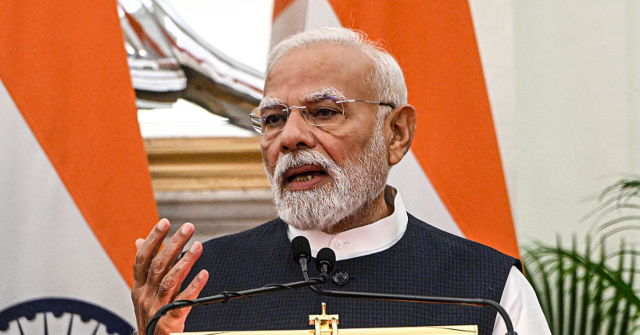Indian Prime Minister Narendra Modi gave an address to the nation on Sunday in which he told his citizens to stop using “foreign made” products.
Modi has been ramping up his calls to buy local as the trade dispute between India and the United States grew more heated.
Modi has been pushing a “Make in India” agenda, also known as “Swadeshi” (self-reliance), to develop domestic production throughout his term as prime minister. His calls to buy domestically-produced goods became more urgent after President Donald Trump imposed a 25 percent general tariff on imports from India, followed by another 25 percent to punish India for supporting Russia’s war in Ukraine by purchasing Russian oil.
Modi pulled out all the stops on Sunday, telling every Indian household and shop to become a “symbol of Swadeshi.”
“Today, knowingly or unknowingly, many foreign products have become a part of our everyday lives,” he mused. “We should buy products that are Made in India, in which the hard work of our country’s youth is invested.”
Modi addressed the nation one day before major reforms to the Goods and Services Tax (GST) go into effect, reducing the tax rates on many household items by ten percent or more just in time for the holiday shopping season in India.
“With the reduction in GST, it will be easier for the citizens of the country to fulfill their dreams,” the prime minister said.
In an open letter to Indian citizens on Monday, Modi touted his “Next Generation GST reforms” as an “added reason to rejoice” during the holiday season of Navaratri, which runs through early October.
“These reforms will boost savings and directly benefit every section of society, be it farmers, women, youth, poor, middle class, traders, or MSMEs. They will encourage greater growth and investments and accelerate the progress of every state and region,” he wrote. MSMEs are India’s term for small and medium-sized business enterprises.
The reforms are also intended to simplify the complex GST code, lifting a heavy burden of compliance from Indian businesses and making purchasing decisions easier for consumers. The Modi administration has been very concerned about diminished household consumption, which could decline further under pressure from Trump’s tariffs.
The BBC on Sunday cited anecdotal evidence from car and motorcycle dealerships that customers are making more inquiries about “unsold inventory” due to the lower tax rates. On the other hand, retail shopkeepers seemed either unaware of the GST reforms, or confused by them — especially since in a few cases, such as higher-priced garments, tax rates are actually going up.
Efforts to settle a trade deal between India and the United States are still ongoing. Indian Foreign Minister Subrahmanyam Jaishankar met with Secretary of State Marco Rubio on the sidelines of the U.N. General Assembly (UNGA) in New York City on Monday, their first meeting since Trump’s higher tariffs on India took effect.
Indian Trade Minister Piyush Goyal arrived in Washington, D.C. for trade deal talks on Monday. Goyal has been among the most optimistic of Indian officials, but even he has insisted India will not budge on protectionism for its agricultural sector, a key demand from U.S. negotiators.
Read the full article here


